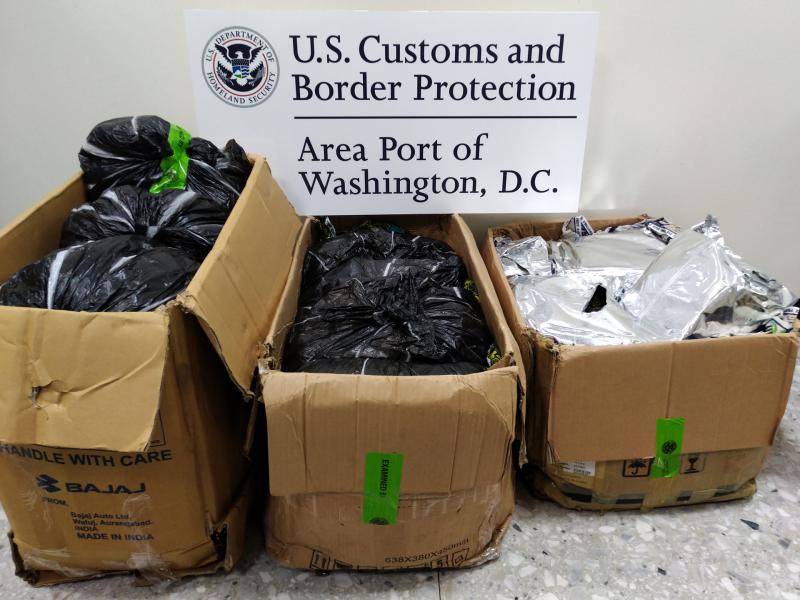STERLING, Va. – U.S. Customs and Border Protection (CBP) officers at Washington Dulles International Airport seized a significant khat load March 21 that shipped from Nigeria and was destined to an address in our nation’s capital.

of khat destined to Washington, D.C.
While examining air cargo that arrived aboard an Etihad Airways flight from Abu Dhabi, UAE, March 5, CBP officers inspected a shipment from Lagos, Nigeria manifested as clothes and dried camellia sinensis, which is organic green tea leaves. When officers opened the shipment, they discovered three boxes that contained dried leaves concealed in silver bags and black plastic bags.
A CBP agriculture specialist initially determined the leaves to be khat. Officers then submitted samples to a U.S. Department of Agriculture botanist, who reported March 20 that the leaves were Catha Edulis, commonly known as khat.
The total weight of the khat was 66.78 kilograms, or 147 pounds, four ounces. The khat has a street value of about $20,000. It was destroyed.
“Customs and Border Protection is deeply engaged in our nation’s whole-of-government response to the serious coronavirus pandemic; however, we remain ever vigilant to conduct our traditional law enforcement missions, including narcotics interdiction,” said Javier Cortes, CBP’s Acting Area Port Director for the Area Port of Washington D.C.
“CBP officers remain steadfast in our duty to protect our communities while hitting back at transnational criminal organizations that thrive on the sale of illicit narcotics to fund their other nefarious businesses,” Cortes said.
Khat is typically grown in East Africa and the Arabian Peninsula and is chewed for its stimulant effect. The World Health Organization classified khat as a drug of abuse in 1980.
The Drug Enforcement Administration classifies cathinone as a schedule 1 drug – the most restrictive category used by the DEA, and cathine as a Schedule IV controlled substance. Read more from the DEA on Khat, and on the DEA Khat Fact Sheet.
CBP officers screen international travelers and cargo, and search for illicit narcotics, unreported currency, weapons, counterfeit consumer goods, prohibited agriculture, and other illicit products that could potentially harm the American public, U.S. businesses, and our nation’s safety and economic vitality.
CBP seized an average of 3,707 pounds of dangerous drugs every day across the United States last year. Learn more about what CBP accomplished during "A Typical Day" in 2019.
CBP's border security mission is led at ports of entry by CBP officers from the Office of Field Operations. Please visit CBP Ports of Entry to learn more about how CBP’s Office of Field Operations secures our nation’s borders, or by visiting www.CBP.gov.
Follow the Director of CBP’s Baltimore Field Office on Twitter at @DFOBaltimore and on Instagram at @dfobaltimore for breaking news, current events, human interest stories and photos.

